Lethabo Moroka
1 year, 1 month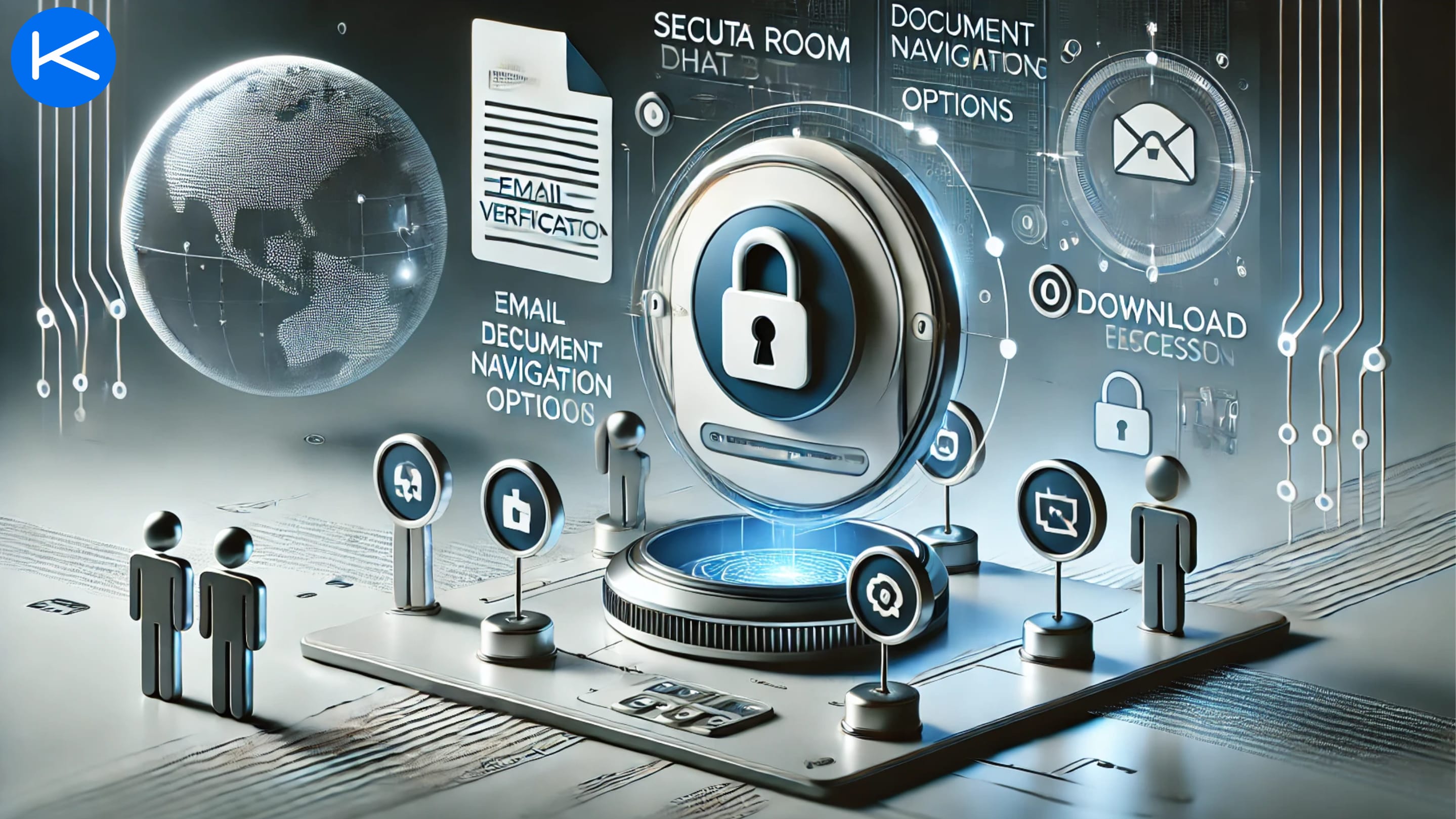
Unlocking Secure Document Sharing with Data Room Chatbots
Sharing important documents via platforms like Google Drive or Dropbox is convenient, but these tools often lack the advanced security and tracking needed for sensitive business documents. When you’re sharing information with investors, employees, or clients, you need to ensure that access is controlled, interactions are tracked, and data remains secure. Traditional methods can be inefficient, leaving sensitive information vulnerable and making it difficult to track document access and usage.

Imagine instead using a data room chatbot, which securely stores your documents and allows you to share them through a single interactive link. This chatbot acts as a gatekeeper, verifying users’ identities and enabling them to navigate and download documents based on their permissions.In this blog, we’ll explore:
- What a data room chatbot is and why it’s essential for secure document sharing
- Why Traditional Document Sharing Falls Short
- Common Security Challenges Addressed
- Future Trends in Data Room Technology
- Key features of data room chatbots
- Benefits of Using a Data Room Chatbot
- Step-by-step guidance on setting up a data room chatbot with KaraboAI
- Comparing Data Room Chatbots with Traditional Virtual Data Rooms
With a data room chatbot, you can streamline document sharing, enhance security, and maintain full control over who accesses your files. Let's dive in and discover how this technology can transform your document management practices.
What is a Data Room Chatbot?
A data room chatbot takes the concept of a virtual data room—commonly used to securely store and share sensitive documents—and enhances it with interactive chatbot functionality. Instead of merely sending a link to a folder, you provide a single chatbot link. This bot serves as a gatekeeper, allowing you to control access, monitor interactions, and make document sharing more secure, interactive, and efficient.
With a data room chatbot, you can decide whether or not to restrict access. If you enable restricted access, users must have their email addresses on a pre-approved list you provide. When a user attempts to access the chatbot, it verifies their email against this list, ensuring only authorized individuals can view or download sensitive documents. This added layer of security means that you maintain full control over who gains entry to the data room, helping to prevent unauthorized access and potential data leaks.
Once authenticated, users can interact with the chatbot to ask questions, navigate through documents, and download full files based on their permissions. This provides a seamless experience, allowing users to find the information they need without sifting through multiple folders and files.
How a Data Room Chatbot Works
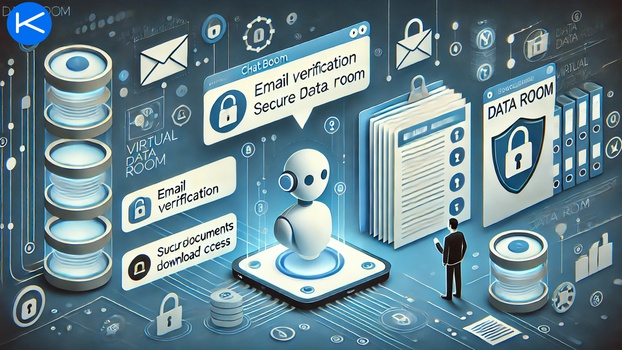
Imagine having all your essential business documents, such as investor pitch decks or employee policies, stored within a secure data room accessible through a single chatbot link. Instead of sharing a standard file-sharing link, you simply provide access to the chatbot, which first verifies each user's identity—typically through email—to ensure they are authorized.
Once verified, users can navigate the documents by interacting with the chatbot directly. They can ask questions about specific topics, like an investor inquiring about your revenue model, and the chatbot will either provide a summary or guide them to the relevant document. For users needing full access, the chatbot also offers secure download options for complete files, such as a pitch deck or company policy, ensuring a seamless and controlled sharing experience.
Use Cases for Data Room Chatbots
- Investor Relations: Share sensitive business documents like pitch decks or financial reports securely with investors.
- Human Resources: Distribute employee handbooks, policies, or training materials while keeping track of who has accessed them.
- Mergers and Acquisitions (M&A): Provide potential buyers with access to critical documents, with the added security and tracking features required for M&A.
- Compliance and Audits: Safeguard compliance documents and allow auditors to access specific files, all while tracking their actions for accountability.
Why Traditional Document Sharing Falls Short
When it comes to sharing sensitive documents, traditional methods like Google Drive or Dropbox links have significant limitations:
- Limited Security: Shared links can easily be forwarded or accessed by unauthorized individuals, making it difficult to maintain control over who can view or download the content. Once a link is shared, it can potentially circulate without your knowledge or consent.
- Difficult Tracking: These platforms generally lack robust tracking features. As a result, it's challenging to monitor who has accessed the documents, when they accessed them, or what specific files they viewed or downloaded. This lack of insight can pose risks, particularly when handling sensitive or confidential information.
- User Experience: With traditional methods, users often need to download entire files or search through folders to locate specific information, which can be cumbersome and inefficient. For recipients, this process can feel like a time-consuming chore, especially when they only need access to specific sections or details within the documents.
Data room chatbots address these challenges by providing a centralized, secure, and interactive solution. They enhance document security by restricting access to authorized users and offer detailed tracking capabilities, so you always know who’s interacting with your files. Moreover, they improve user experience by allowing recipients to engage with documents conversationally, finding exactly what they need without unnecessary downloads or navigation.
Common Security Challenges Addressed
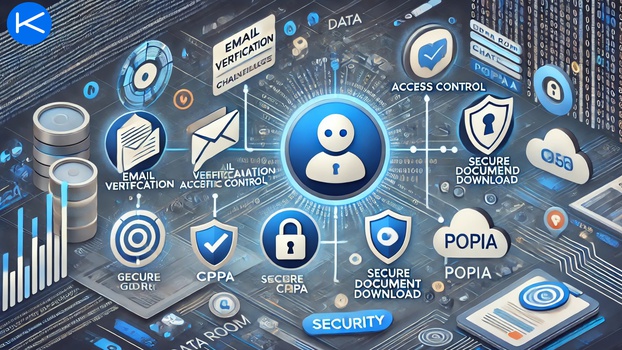
Data room chatbots are designed to tackle some of the most pressing security challenges businesses face when sharing sensitive documents. Here’s how they help address these issues:
- Preventing Unauthorized Data Sharing: With traditional file-sharing platforms, it’s easy for links to be forwarded or accessed by unauthorized individuals, leading to potential data exposure. Data room chatbots use features like email verification, restricted access lists, and even two-factor authentication (2FA) to ensure that only authorized users can view or download documents. This significantly reduces the risk of unauthorized data sharing and provides you with greater control over who can access your sensitive information.
- Ensuring Compliance with Data Protection Regulations (POPIA, GDPR, CCPA): Data privacy laws such as South Africa's Protection of Personal Information Act (POPIA), the General Data Protection Regulation (GDPR) in Europe, and the California Consumer Privacy Act (CCPA) in the United States require organizations to implement stringent measures for protecting personal information. Data room chatbots help businesses comply with these regulations by providing features like access controls, secure data storage, and detailed audit trails, which ensure that user data is handled responsibly and transparently.
- Mitigating Risks Associated with Data Breaches: Data breaches can have severe financial and reputational impacts on a business. By utilizing encryption, secure authentication, and real-time monitoring, data room chatbots create a secure environment for document sharing. These chatbots can also track every interaction with a document, allowing for immediate detection and response to any suspicious activity. This proactive approach helps to mitigate the risks associated with data breaches, providing an extra layer of security.
- Maintaining Data Integrity and Accountability: Unauthorized edits, downloads, or sharing of documents can compromise data integrity and create accountability challenges. Data room chatbots maintain detailed logs of all user actions, making it easy to track document access and changes. This not only enhances security but also provides valuable records for audits, ensuring accountability for each user’s interactions with sensitive data.
Future Trends in Data Room Technology
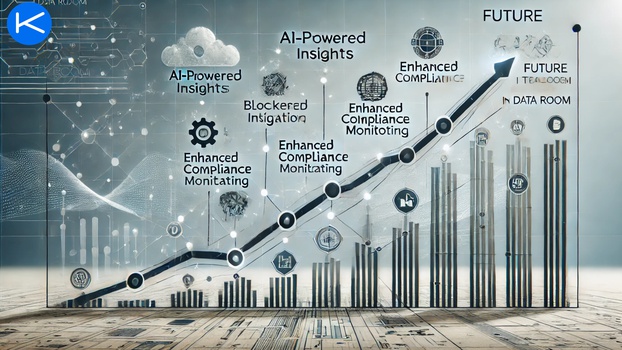
As technology continues to evolve, data room chatbots are likely to become even more advanced, incorporating new features and integrations to meet the growing demands of secure document sharing. Here are some key trends that could shape the future of data room chatbots:
- AI-Powered Insights and Personalization: Future data room chatbots will likely leverage AI to provide even more intelligent insights. For example, chatbots could analyze user behavior to personalize interactions, anticipate user needs, and suggest relevant documents based on previous inquiries. AI advancements could also enhance the chatbot’s ability to answer complex queries, making document navigation even smoother and more intuitive.
- Blockchain for Data Integrity and Security: Blockchain technology could be integrated into data room chatbots to further enhance data integrity and security. By utilizing blockchain, chatbots could create an immutable ledger of document access and downloads, ensuring a transparent and tamper-proof record of all interactions. This would be particularly valuable for industries requiring stringent data security and audit trails, such as finance and healthcare.
- Enhanced Integrations with Business Tools (CRM, ERP, etc.): Data room chatbots are likely to offer deeper integrations with other business tools, such as CRM and ERP systems, making it easier for organizations to manage documents across platforms. For instance, a chatbot could pull data directly from a CRM to tailor document access based on client profiles or integrate with an ERP system to update documents in real-time as new information becomes available. This seamless integration would streamline workflows and improve data consistency across systems.
- Automated Compliance Monitoring: As compliance regulations become more complex, data room chatbots may incorporate features for automated compliance checks. These advanced chatbots could monitor interactions in real-time, ensuring that all document sharing adheres to specific regulatory requirements, such as GDPR or HIPAA. Automated compliance alerts and reporting would give organizations peace of mind, knowing that their data room chatbot is continuously safeguarding against potential violations.
- Voice-Activated Document Access: With the growing popularity of voice-activated technology, future data room chatbots might support voice commands, allowing users to navigate documents hands-free. This could enhance user experience, especially in settings where users need quick, convenient access to information without typing, such as during presentations or meetings.
By embracing these emerging trends, data room chatbots will continue to evolve, providing businesses with more robust, secure, and versatile solutions for document management and sharing.
Key Features of a Data Room Chatbot
- Email Verification: To ensure only authorized individuals access the chatbot, each user must verify their email address. This feature restricts entry to invited users, adding an essential layer of security. It also helps in maintaining a detailed list of who accessed the chatbot, which is useful for compliance and monitoring.
- Detailed Access Control: With data room chatbots, you can customize access based on user roles or permission levels. This ensures that each user can only view the documents relevant to them. For example, you might allow investors to see financial reports while granting employees access to company policies, all within the same data room.
- Secure Document Downloading: Users can securely download full documents through the chatbot. Every download is tracked, giving you detailed insights into who accessed specific files. This feature is particularly valuable when dealing with sensitive information, as it helps prevent unauthorized sharing and ensures accountability.
- Interactive Q&A: The chatbot can respond to users’ questions about the documents, guiding them to relevant sections or providing summaries of key information. This interactive element improves user experience, as it allows users to quickly find the details they need without combing through entire files.
- Real-time Insights: Data room chatbots provide real-time analytics, showing you how users are interacting with the documents. You can monitor document views, track downloads, and even see what questions users are asking. These insights help you understand how your content is being used and make adjustments to improve both security and engagement.
Benefits of Using a Data Room Chatbot
- Enhanced Security: Data room chatbots ensure that only authorized users can access sensitive information. By verifying each user’s email address, the chatbot restricts access to those with permission, providing a more secure way to manage document sharing. This added layer of security helps prevent unauthorized access and reduces the risk of data leaks.
- Simplified Navigation: Instead of having to download multiple files and sift through them to find relevant information, users can interact with the chatbot directly. They can ask questions and receive targeted answers or be directed to specific documents. This streamlined process saves time and provides a more intuitive way to access information.
- Tracking and Insights: Data room chatbots give you visibility into user interactions with your documents. You can track who accessed the files, see what they downloaded, and understand how they engaged with the chatbot. These insights are invaluable for preventing unauthorized sharing, identifying trends in document usage, and making informed decisions about content management.
Using a data room chatbot not only strengthens security but also enhances the user experience by simplifying document navigation and providing valuable insights into how your information is accessed and utilized.
Creating Your Own Data Room Chatbot with KaraboAI
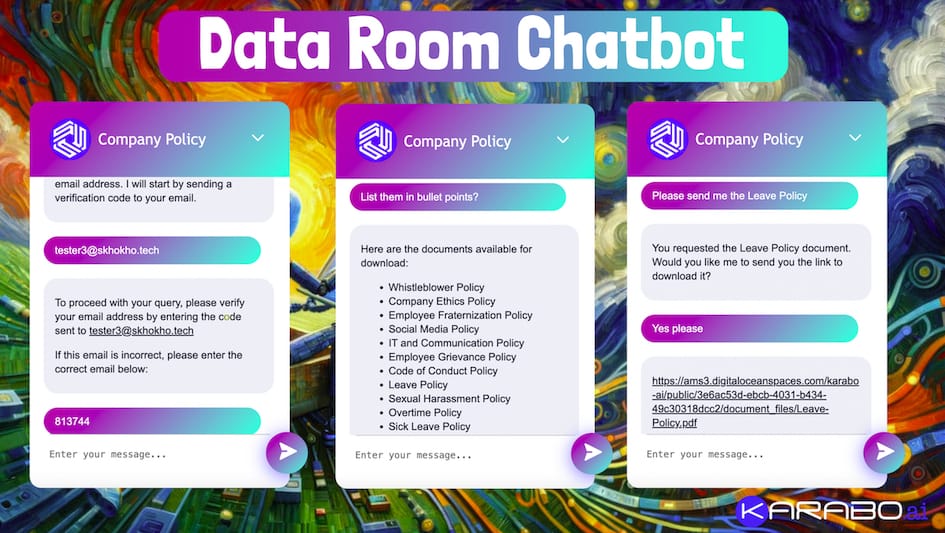
Setting up a data room chatbot with KaraboAI is a straightforward process. Here’s a quick guide to get you started:
- Set Up Your Chatbot: Begin by creating a new chatbot on KaraboAI.
- Email Verification and Access Controls: Implement email verification to restrict access to invited users only. For additional security, consider enabling two-factor authentication (2FA) for highly sensitive documents.
- Upload Documents: Securely upload your files to the data room. If you want users to download specific documents, upload them again under “files users can download.”
- Customize Interactions: Set up the chatbot’s greetings and responses to provide a user-friendly experience, guiding users through document access and any queries they may have.
- Customize the Look and Feel of the Bot: Tailor the chatbot's appearance to align with your brand or project, enhancing its visual appeal and usability.
- Launch and Monitor: Once your data room chatbot is live, share the link with your target audience. You can then track access patterns, monitor document downloads, and gain full control over how your data is being used.
For a more detailed guide, check out this blog: How to Create a Data Room Chatbot
Comparing Data Room Chatbots with Traditional Virtual Data Rooms
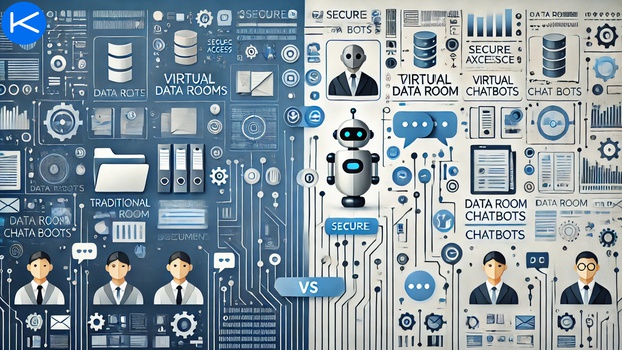
Data room chatbots enhance the functionality of traditional virtual data rooms by incorporating conversational AI, providing several distinct advantages:
- Improved Usability: With a chatbot interface, users can access information through natural conversation rather than navigating through multiple folders. This conversational approach simplifies document retrieval and enhances the overall user experience.
- Enhanced Engagement: Chatbots offer a more interactive experience, inviting users to ask questions and engage directly with the content. This encourages users to explore information more actively, as they can receive instant answers and be directed to relevant documents.
- Scalability: As your business grows, data room chatbots can be easily scaled to handle more users and documents without compromising security. This adaptability ensures that your data-sharing solution remains efficient and secure, even as your needs evolve.
By combining the secure document storage of a traditional data room with the interactivity of a chatbot, data room chatbots offer a modern, user-friendly solution that scales with your business needs.
Final Thoughts
Ready to elevate your document sharing to a whole new level? Data room chatbots provide the security, interactivity, and insights you need to manage sensitive documents confidently. Imagine sharing a single link that not only verifies users but also guides them directly to the information they need—all while giving you full control over who’s accessing your files.

Don’t just settle for traditional data rooms when you can have a smart, scalable, and user-friendly solution. Take the leap and discover how KaraboAI can transform your document management. Click the link below to start creating your own data room chatbot today, and experience the future of secure document sharing!


